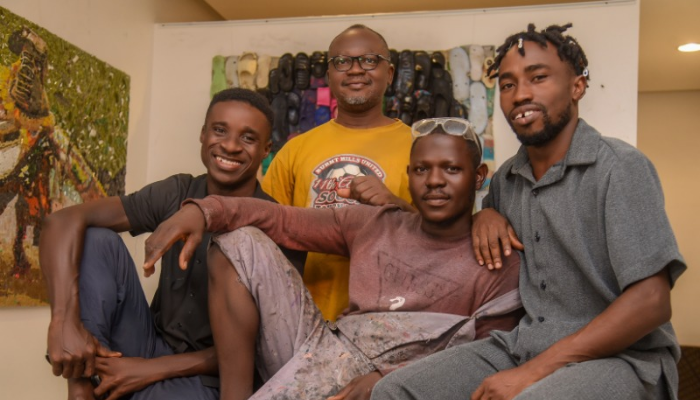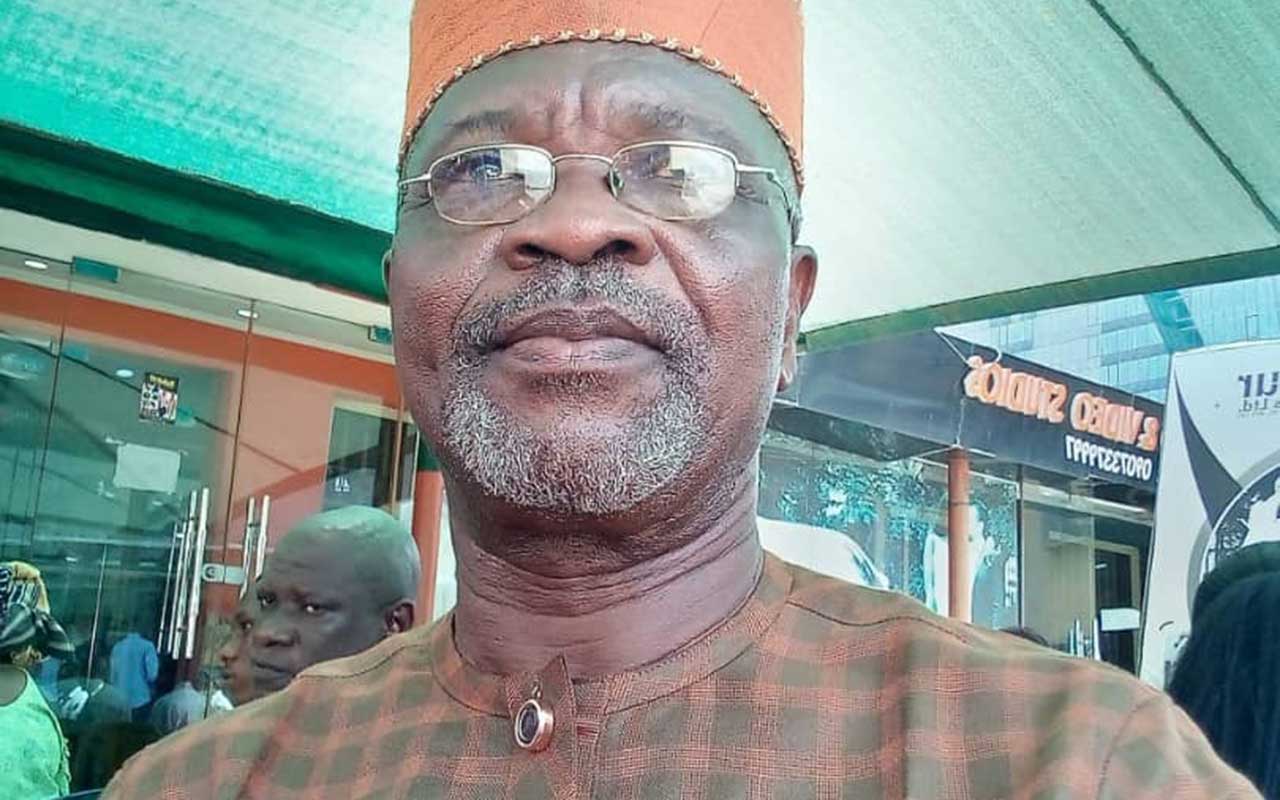 From February 15 to March 1, 2025, Alexis Galleries will open its doors to art lovers, collectors and the public to visit and appreciate the creative ingenuity of the four artists — Francis Denedo (metals), Eugene Konboye (rubber), Olushola Olajobi (nylon and plastics) and Yusuf Riluwan Idowu (glass and tiles) — whose works, across different media, are sheer beauties on canvas.
From February 15 to March 1, 2025, Alexis Galleries will open its doors to art lovers, collectors and the public to visit and appreciate the creative ingenuity of the four artists — Francis Denedo (metals), Eugene Konboye (rubber), Olushola Olajobi (nylon and plastics) and Yusuf Riluwan Idowu (glass and tiles) — whose works, across different media, are sheer beauties on canvas.
Titled, Recycling Matters, the show is in collaboration with The Macallan Highland Single Malt Scotch Whisky. Both organisations share a common goal of promoting Nigerian art while highlighting the use of recycled materials from waste polluting the streets of Lagos. This initiative aims to create a meaningful connection with the environment through their work.
The Macallan had been long synonymous with innovative distillation practices and an unwavering commitment to sustainability. As a leader in the whisky industry, it is redefning the standards of environmental responsibility, integrating eco-conscious practices into every aspect of its operations.
With a bold vision to achieve net-zero emissions by 2045 and reduce emissions by 50 per cent by 2030, the Macallan is pushing the boundaries of innovation and sustainability.
Since 2021, the distillery has achieved carbon neutrality; harnessing 99 per cent verified renewable energy sources, including wind turbines, biomass steam, and renewable natural gas.
The Macallan’s dedication to minimizing its environmental footprint is evident in its carbon sequestration initiatives, such as land management and offsetting. Innovative solutions like heat recovery systems and an all-electric and hybrid vehicle fleet further demonstrate the brand’s passion for reducing energy consumption and emissions. Water conservation is also a top priority, with the distillery employing sustainable water-sourcing practices that protect the River Spey’s ecosystem.
Last year, from September 30 to November 30, 2024, the four gifted visual artists gathered for a seemingly anticipated art residency of the year. The month-long residency, which held during the Lagos art season, practically set Alexis Galleries, the venue, on fire as the young artists engaged in healthy rivalry, whose result is being showcased this month.
Apart from their passion, their quest for cleaner and safer environment and hunger to experiment with other forms of art have led them to pick on found objects and discarded materials, and turning the supposedly waste into gold through their enthralling works.
On show at the exhibition are 16 works, four from each artist, from different found materials including; stain glasses, rubber, scrap metal and nylon wastes, which all bear the signature of their makers.
Recycling Matters I bring together innovative works that capture the hidden value and essence in wastage, inviting viewers to reconcile their place and role in recycling everyday discarded objects, while nurturing a safe, environmental management culture.
Speaking on Recycling Matters I, founder, Alexis Galleries, Patty Chidiac Mastrogiannis, said the gallery is excited to bring together these four interdisciplinary artists working with found objects and materials, who implore diverse innovative approaches to the idea of waste and utility, through forms and colour, while producing aesthetical assemblage of works that connects the human condition to materiality and consumption.
“Their works feature a wide range of mediums from different found materials including stain glasses, rubber, scrap metal and nylon wastes,” she said.
Mastrogiannis said “by repurposing discarded objects found and collected from their immediate environs, these artists reutilize and recover our penchant engagement with wastefulness and consumer excesses, while making social commentary on pressing issues, which addresses the human experience, inequality, injustice, mismanagement and environmental pollution.”
She added, “Recycling Matters I aims to inspire viewers to reconnect with the idea of reinvention and social intervention, by transforming community-dumped debris into aesthetic treasure. In a society paralysed by waste and consumption, this exhibition motivates viewers to take proactive, responsive efforts towards their immediate environment and society.”
In his curatorial statement, Uche Obasi said: “Recycling Matters I engages with the social reality of waste, utility and functionality, in light of profusion of consumer excesses and socio-economic factors. The exhibition explores these issues through a wide range of mediums from a variety of found materials includingstain glasses, rubber, scrap metal and nylon wastes.”
He said, “this exhibition draws us in to take part in the process and result of remaking, reinvention and reusage, revealing everyday objects that re-connect our place in its utility, grace and duality of meaning.
“Through forms and colour, these artists produce aesthetic assemblage of works from
installation, sculpture and multimedia combinations that reflect and connect the human condition to consumption and environmental pollution.”
Konboye, a graduate of Auchi Polytechnic, where he earned a distinction in painting, sees tales of resilience in discarded footwear, breathing new life and transforming each pair into a testament of human experience.
Driven by necessity and resourcefulness, Konboye’s fascination for post consumer material began at a very young age. Konboye would collect discarded items from his neighborhood and modify them for personal uses, like gaming and as makeshift stamps to print on shirts and also as temporary tattoos on the skin. This playful experimentation laid the foundation for his artistic journey.
Konboye’s innovative approach to art and eco-awareness has caught the attention of prominent media outlets like Reuters and BBC, who have featured his inspiring story of turning waste into art.
Ultimately, his purpose is to inspire a new generation of sustainable artists such that when waste becomes art, Konboye is the name that comes to mind.
His work Bose pushes beyond the boundaries of gender limitations on survival and livelihood.
Idowu, a painter from the famous Auchi Polytechnic, Auchi, Edo State, where he obtained the Higher National Diploma (specializing in painting), after he has been trained as a sculptor under the supervision of Uduh Maduka Francis (ARTDEALS STUDIO) at the Universal Studios of Art, National Theatre, Iganmu, Lagos, Nigeria.
His formal concerns draw upon the aesthetic, his works offering a deeper understanding of his background and environment to capture the beauty of the ordinary and mundane. His artistry transforms found materials into vibrant, thought-provoking narratives. Most of his recent series are intended to puzzle the mind of viewers and his subject often present rhetorical questions about cultural believes.
He experiments with various materials from his surrounding, suitable to depict his story at any given time. He continues to participate in several group exhibitions and commissions within and outside the country. He has also been featured in many monumental projects.
He employs systematic cubic arrangement of retro-reflective debris of broken pieces of glass bottle drinks harmonized in different shades, textures and vibrant colors. Idowu’s work, “Elegance of Heritage” portrays a portrait and cultural identity of a young woman, adorned with simple yet meaningful tribal markings.
Using discarded scrap metal, Denedo crafts used materials into forms and meanings, to address the age-long, universal human quest for freedom and autonomy. Denedo’s work reminds us of the human need to act with courage, resilience and determination in the face of adversity. His sculptural work “emancipation” is an expressive gesture on defiance, resistance and liberty.
For Olajobi, working with nylon wastes allows him to explore the interplay of everyday consumption, utility, and disposal. Olajobi’s Infestation Series I is a sculptural installation that invites the viewers to confront the overwhelming presence of nylon waste in our environment. He recontextualizes waste as a primary material, challenging our perceptions of value while making commentary on waste pollution and sustainable environmental management practices in Nigeria: His captivating artworks, often characterised by meticulous attention to detail, challenge viewers to confront their own roles in the cycle of consumption and waste. His body of works invites audiences to examine the powerful, psychological influences that drive consumer behavior through his skillful juxtaposition of art and science, exploring how advertising techniques impact consumer choices and contribute to the climate crisis. His works often incorporate discarded materials and upcycled waste, especially nylon and plastic wastes, challenging societal norms and sparking conversations about environmental and social responsibility.
Through exhibitions, his evocative artworks captivate audiences with their aesthetic brilliance and ignite important conversations about the intersection of art, climate change, water, politics of extraction, consumerism, and the pressing need for environmental and social stewardship in contemporary Africa.
His creations serves as a compelling commentary on the urgent need for sustainable practices in Africa and beyond, by encouraging individuals and communities to reconsider their relationship with the environment and to seek innovative solutions for reducing plastic waste and protecting our planet’s delicate ecosystems. His artistic philosophy emphasizes the interconnectedness of human and non-human entities, advocating for a harmonious coexistence with the natural world.





